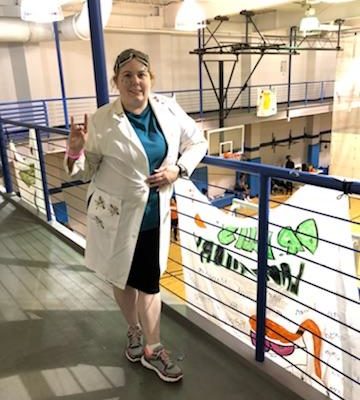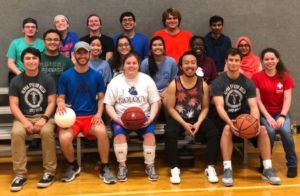
I have always loved school. From my earliest days in elementary school to my graduate school experience, I loved learning, being involved in extracurricular activities, and hanging out with friends. So, college was always my next step after high school. Even though my parents didn’t go to college, they encouraged my twin sister and I to go and earn our degrees. We were all new to the college experience, from filling out paperwork, visiting colleges, asking the right questions, to picking out courses. But one thing I learned early in the process was to find the college that felt “right” for me. I knew I wanted to go to a smaller school for many of the reasons that your loved one might have chosen HCU. I wanted to be in classes where faculty and classmates got to know me, where I wasn’t lost in the shuffle. Even as I chose a graduate school, I used the same metrics. “Where do I feel at home?” “Where do I feel appreciated?” “Where can I excel?” One of the reasons I wanted to be a biology professor at HCU was because HCU and the College of Science and Mathematics (COSM) felt like home. From my first day to five years later, this is still true. Even though Biology is one of the largest undergraduate programs on campus, we get to know our students very well. Whether it is in lecture, lab, participating in one of our COSM-clubs (TriBeta honor society, pre-health profession, pre-dentistry, pre-optometry, pre-physician assistant, pre-therapy, Chemistry, Physics), or working on research projects, we are right there with our students. We take the time to get to know, mentor, and encourage them. We also rejoice in their maturation from their freshmen year to their senior year. Thus, as our students apply to medical school, dental school, graduate school, or other programs we can write very personalized and detailed letters of recommendation.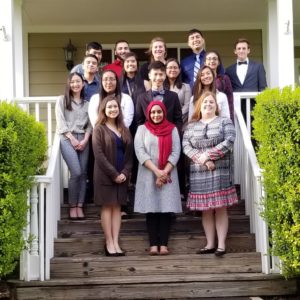
Having enjoyed my computer science courses in high school, I started college as a computer science major and biology minor. However, halfway through college I decided to swap my major and minor. I pondered several questions. “What do I want to learn more about?” “What are my strengths?” “What is my career goal?” As I advise my students, I share with them these questions and the importance of finding and following your calling. Knowing that doing so takes time, patience, resiliency, and sometimes thinking outside the box. The benefit of a liberal arts education, like that at HCU, is that a student takes courses in so many different disciplines helping determine what one likes and maybe more importantly, what one doesn’t like. And this broad educational 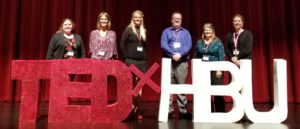 foundation helps shape a major, just as it did mine. I enjoyed taking my core courses, such as math, sociology, psychology, and history, because it exposed me to different people and perspectives. Similarly, in my Global Health class here at HCU we discuss religious, sociological, psychological, business, and ethical factors that affect health care across the world. Many of our Biology or Biochemistry and Molecular Biology students are looking for a career in healthcare and understanding how these other disciplines affect their potential job is crucial.
foundation helps shape a major, just as it did mine. I enjoyed taking my core courses, such as math, sociology, psychology, and history, because it exposed me to different people and perspectives. Similarly, in my Global Health class here at HCU we discuss religious, sociological, psychological, business, and ethical factors that affect health care across the world. Many of our Biology or Biochemistry and Molecular Biology students are looking for a career in healthcare and understanding how these other disciplines affect their potential job is crucial.
In addition to my academics, I participated in a variety of activities (intramural volleyball and basketball, Honors College, honor societies, church events, and more) while in college. In both undergraduate and graduate school, having time to relax and socialize was important. But finding the right mixture of fun and learning is key. Time management is always a vital skill. As a faculty member I have biology classes I need to prep and teach, papers to grade, and meetings to attend. But I also sponsor TriBeta (biology honor society), coordinate HCU Biology’s social media accounts, play intramural volleyball, cheer on HCU athletics, teach Freshmen Year Seminar, disciple students, teach College Sunday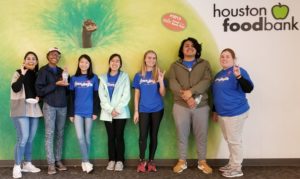
School and Youth Small Groups at my church, and participate in other HCU & non-HCU events. Just as my hobbies and activities help me be a better professor and meet faculty, staff, and students from across campus, students who participate in extracurricular opportunities can build new relationships, improve their communication and leadership skills, and have fun. Thus, I encourage my students to try different types of clubs or events (academic, social, cultural, spiritual) to find the ones that feel “right” and worthy of their time. I feel that to be successful in college and beyond that students should take advantage of the academic resources (e.g. Academic Support and Resources, Health Professions Office), spiritual, and service opportunities available. And of course, the one piece of advice I tell all of my students is “Go to class”, followed by “Take good handwritten notes.” Students should learn the material presented in class, but also understand why the information is important and how that information fits into the greater scheme of their discipline. For example, in Biology, we offer a wide variety of upper level electives, but they are all based on a handful of foundational courses (General Biology I and II, Cell & Molecular Biology, and Genetics). Remembering the information for a
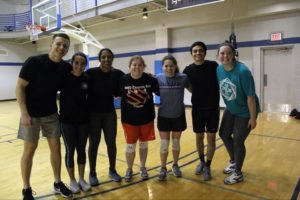 Genetics test is important in Genetics, but students who can retain that information and apply it to their Molecular Biology class later in their academic careers will reap the benefits.
Genetics test is important in Genetics, but students who can retain that information and apply it to their Molecular Biology class later in their academic careers will reap the benefits.
I know that the keys to my college success are likely not the same for other students. But I hope that whether it is from this blog, time in the classroom, or casual conversations on campus that you and your loved ones understand that I, and my fellow faculty, are here to help students learn, think, and grow personally, spiritually, and professionally.
